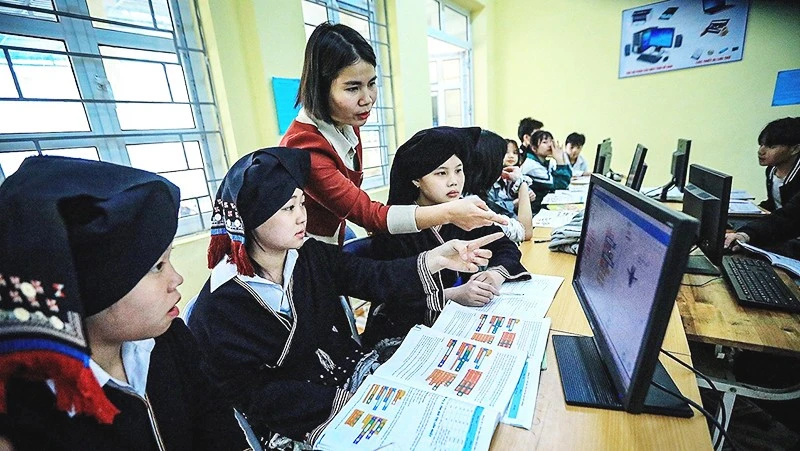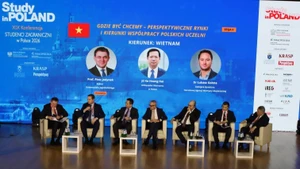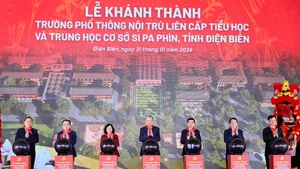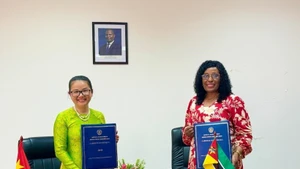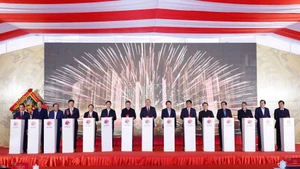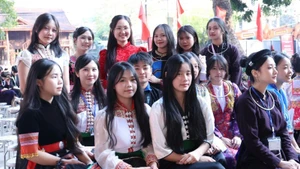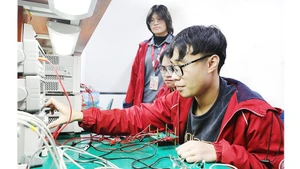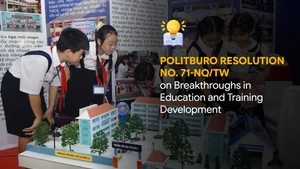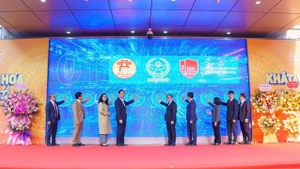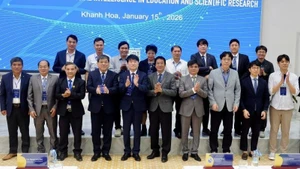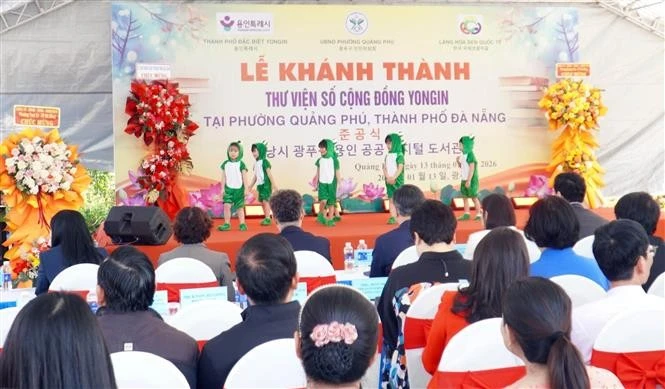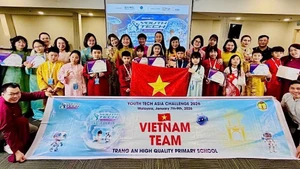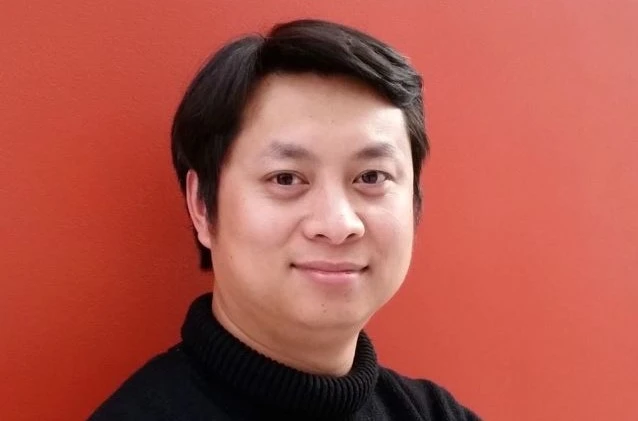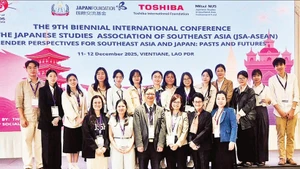Many era-defining breakthroughs
Associate Professor, Doctor Hoang Minh Son, Deputy Minister of Education and Training, assessed that the issuance of Resolution 71-NQ/TW by the Politburo is a historic event. This is a guiding document, expressing the strong political determination of our Party to create a fundamental, comprehensive, and practical transformation for the cause of “nurturing people.”
Associate Professor, Doctor Nghiem Xuan Huy, Director of the Institute for Digital Training and Assessment, Viet Nam National University, Ha Noi, stated that the breakthrough nature of Resolution 71 does not lie only in individual policies but in its strategic vision, holistic mindset, and strong determination for action. For higher education, Resolution 71 is truly a historic “push,” opening up an unprecedented development corridor.
Firstly, is the issue of targeted budget investment. Accordingly, spending on higher education will reach at least 3%. This creates a stable financial foundation, enabling universities to build long-term strategies instead of operating on a year-to-year budget basis.
Secondly, is the granting of comprehensive university autonomy to higher education institutions. Removing the dependency between the degree of autonomy and financial capacity has the meaning of unleashing the potential of all public universities, not just those with large revenues. This will help develop a more dynamic higher education system, where universities can independently design training programmes in line with the market, autonomously recruit talent without being constrained by complex administrative procedures, and manage finances flexibly to optimise resources.
Thirdly, is the openness to special preferential policies to attract talent. This breakthrough directly addresses the issue of “brain drain” and attracts talent for academia. Setting the specific target of recruiting 2,000 international lecturers is a strong statement of the determination to globalise the teaching staff.
Fourthly, is the recognition of digital transformation and AI as core drivers. Associate Professor, Doctor Nghiem Xuan Huy said this is an era-defining breakthrough. The impact of this orientation will be a strong impetus for building smart universities, personalised learning pathways, and forcing universities to comprehensively reform training programmes to integrate digital skills and prepare human resources for the digital economy.
Fifthly, Resolution 71 has set a clear international ambition for higher education institutions.
Sixthly, the Resolution introduced specific policies and solutions for strong reform of the governance model. This is a major political-administrative reform aimed at streamlining the apparatus and strengthening the leadership of the Party. The significance of the model “Party Secretary concurrently the head” is to unify will and action, eliminating potential conflicts between political leadership and professional management. Its impact may help decisions to be made more swiftly and decisively.
Finally, is the orientation to prioritise the development of elite universities and scientific research. This policy reflects a strategic “spearhead” mindset, concentrating resources to create several world-class research universities.
Education as a top national policy
Associate Professor, Doctor To Van Hoa, Rector of Ha Noi Law University, said that “For many years, the Party and the State have always cared for and invested in education. Resolution 71 is of great significance for the development of education in our country, clearly reflecting the spirit that education is the top national policy. By placing education and training at the centre of the national development strategy, Resolution 71 also affirms that the future of the country is determined first and foremost by the quality of people and knowledge we cultivate today. Especially in the knowledge economy era, national strength no longer relies on resources or cheap labour but on the quality of human resources, creativity, and scientific-technological knowledge. Putting education and training at the centre is not only prioritising one sector but also laying the foundation for all pillars of the nation, from economy, science and technology, defence, security to culture and international integration.”
Considering education as the top national policy, Resolution 71-NQ/TW reflects the great attention of the Party and State to education, teachers, and school staff. Specifically, there are special, superior preferential policies for teachers; raising preferential allowances for pre-school and general education institutions to a minimum of 70% for teachers, at least 30% for staff, and 100% for teachers in extremely disadvantaged, border, island, and ethnic minority areas; developing suitable policies to mobilise skilled professionals outside the teaching force to participate in teaching and training in educational institutions; implementing a joint-appointment regime for talented individuals working in public service units; creating mechanisms to encourage skilled individuals to lead scientific research activities in educational institutions.
Teacher Pham Duc Vinh, Principal of Phuc Khanh Primary and Secondary School No. 1, Bao Yen commune, Lao Cai province, stated: “Raising preferential policies will help teachers feel secure in their work, stabilise their lives, and continue to be attached to the profession. When their lives are guaranteed, teachers will surely devote themselves wholeheartedly to their students. Although there are still many difficulties, as long as there is recognition, each teacher will not hesitate to continue dedicating to the profession.”
Ambition to reach the world
Resolution 71 sets out ambitious goals: By 2035, Viet Nam will have at least five universities in the world’s top 100; by 2045, Viet Nam’s education system will be among the world’s top 20 most equitable and modern. According to Professor Nguyen Dinh Duc, former Chairman of the University Council of the University of Engineering and Technology (Viet Nam National University, Ha Noi), this goal “is not unrealistic.” He pointed out that in recent years, Viet Nam has made remarkable progress: for the first time, a university entered the world’s top 500, many disciplines advanced into the top 100-150, and the number of international publications and research collaborations has grown strongly.
One bright spot in the Resolution is its emphasis on building innovation-oriented universities, new-generation technology universities, becoming centres of research, invention, and leading the national innovation ecosystem. In addition, it promotes making English the second language, while popularising digital skills and the responsible application of artificial intelligence (AI) in teaching and learning.
Professor Nguyen Dinh Duc affirmed that “Resolution 71 is not just an orientation, but a political mandate and the aspiration of the nation. This is a comprehensive reform, comparable to major milestones in our history of renewal. I believe that with high determination and effective implementation, we will witness a new era of Vietnamese education – an era of integration, innovation, and global reach.”
